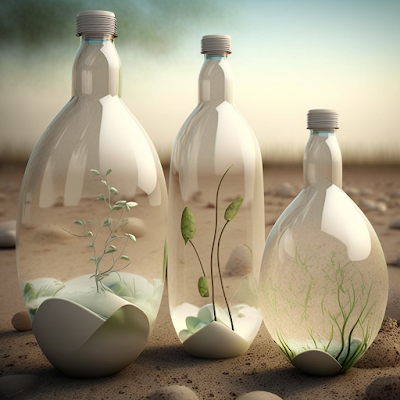 |
| Benefits Of Using Biodegradable Diapers |
Are you a parent looking for an eco-friendly alternative to traditional diapers? Look no further! Biodegradable diapers offer a sustainable solution that not only benefits the environment but also provides numerous advantages for you and your baby.
In this article, we will explore the benefits of using biodegradable diapers, from their rapid decomposition to the reduction of landfill waste. So, if you're ready to make a positive impact on the planet while keeping your little one comfortable, keep reading!
When it comes to environmental impact, conventional diapers are a major concern. Did you know that they can take up to 500 years to decompose in landfills? This staggering statistic highlights the urgent need for more sustainable diaper options.
Biodegradable diapers, on the other hand, break down much faster due to their plant-based materials. Made from renewable resources such as bamboo and cornstarch-based fibers, these diapers have been scientifically designed to decompose within months rather than centuries.
By choosing biodegradable diapers, you can significantly reduce your carbon footprint and contribute towards a healthier planet for future generations.
Key Takeaways
- Biodegradable diapers decompose much faster than conventional diapers, taking only months instead of centuries.
- Using biodegradable diapers reduces landfill waste and contributes to a healthier planet.
- Biodegradable diapers are made from plant-based materials like bamboo and cornstarch, minimizing environmental impact.
- Choosing biodegradable diapers promotes sustainability and a greener future for generations to come.
Environmental Impact of Conventional Diapers
Did you know that using conventional diapers has a significant negative impact on the environment? Every year, millions of disposable diapers end up in landfills, where they take hundreds of years to decompose. The production and disposal of these diapers contribute to greenhouse gas emissions, water pollution, and deforestation.
As more parents become aware of the environmental consequences, sustainable parenting practices are gaining popularity. One solution is to switch to eco-friendly diapers that are biodegradable and made from renewable resources.
The environmental impact of conventional diapers is staggering. It's estimated that a single baby will use around 5,000 disposable diapers before being potty trained. This amounts to approximately 3.5 million tons of diaper waste per year in the United States alone. These diapers contain plastic materials that don't break down easily, leading to long-lasting pollution in our landfills.
In addition to their slow decomposition rate, conventional diapers also contribute significantly to greenhouse gas emissions throughout their lifecycle. The production process involves the use of fossil fuels and chemicals, releasing harmful pollutants into the air and waterways. Furthermore, the transportation and disposal of these bulky products further increase carbon emissions.
By transitioning to biodegradable diapers, parents can greatly reduce their carbon footprint while still ensuring the comfort and hygiene of their babies. Biodegradable diapers are made from plant-based materials such as bamboo or cornstarch instead of petroleum-based plastics found in conventional ones. These natural materials allow for rapid decomposition once they're discarded.
With an increased focus on sustainable parenting practices, using biodegradable diapers becomes a simple yet effective way to minimize our environmental impact. By choosing eco-friendly options over conventional ones, we can help reduce landfill waste and decrease greenhouse gas emissions associated with diaper production and disposal. Transitioning towards more sustainable choices like biodegradable diapers sets us on a path towards a greener future for generations to come.
Rapid Decomposition of Biodegradable Diapers
The rapid decomposition of these environmentally-friendly diapers allows for a more sustainable waste management system. Unlike conventional diapers that can take hundreds of years to break down, biodegradable diapers are designed to decompose within a relatively short period of time. This is achieved through the use of materials that are easily broken down by natural processes, such as bacteria and fungi.
Studies have shown that biodegradable diapers can fully decompose in as little as 3 months, significantly reducing the burden on landfills and minimizing their environmental impact. One key factor in the rapid decomposition of biodegradable diapers is the use of plant-based materials. These diapers are often made from renewable resources like bamboo or cornstarch, which are known for their ability to degrade quickly and naturally.
The plant-based materials used in these diapers not only contribute to their rapid decomposition, but also make them safer for the environment throughout their entire lifecycle. By utilizing sustainable resources instead of relying on non-renewable petroleum-based materials like conventional diapers do, biodegradable diapers help to reduce carbon emissions and conserve natural resources.
Overall, the rapid decomposition of biodegradable diapers offers a multitude of benefits for waste management and the environment. Not only does it alleviate pressure on overflowing landfills by breaking down quickly, but it also reduces pollution and conserves valuable resources through its use of plant-based materials. By making the switch to biodegradable diapers, you can actively contribute towards a more sustainable future while still ensuring your baby's comfort and hygiene needs are met.
Next, let's explore how these plant-based materials in biodegradable diapers further enhance their eco-friendliness without compromising performance or quality.
 |
| Plant Based Best for Biodegradable Diapers |
Plant-Based Materials in Biodegradable Diapers
Experience the incredible eco-friendliness and exceptional performance of biodegradable diapers, enhanced by the use of plant-based materials. These diapers are made from renewable resources such as bamboo, cornstarch, and wood pulp. By incorporating these plant-based materials into the production process, manufacturers are able to reduce their reliance on non-renewable resources like petroleum.
This not only helps to conserve natural resources but also reduces carbon emissions associated with traditional diaper manufacturing.
Plant-based materials in biodegradable diapers offer several advantages over their conventional counterparts. Firstly, they're free from harmful chemicals such as chlorine, phthalates, and fragrances that can cause skin irritation and allergies in babies. Secondly, these diapers are highly absorbent due to the natural fibers used in their construction. They effectively wick away moisture from your baby's delicate skin and keep them dry for longer periods of time. Additionally, the use of plant-based materials allows for better breathability, preventing diaper rash and discomfort.
Incorporating plant-based materials into biodegradable diapers is a significant step towards reducing landfill waste caused by disposable diapers. Unlike regular diapers that take hundreds of years to decompose, biodegradable diapers break down much faster due to their composition of natural materials. As these diapers decompose, they release valuable nutrients into the soil instead of contributing to pollution in landfills. This sustainable solution not only benefits our environment but also promotes a healthier future for generations to come.
Transitioning seamlessly into the next section about the 'reduction of landfill waste', you'll discover how biodegradable diapers help tackle this pressing issue while ensuring comfort and convenience for both you and your baby.
Reduction of Landfill Waste
Imagine the relief you'll feel knowing that by choosing plant-based materials in your baby's diapers, you're actively reducing landfill waste and creating a cleaner, healthier world for future generations.
Traditional disposable diapers take centuries to decompose in landfills, contributing to the growing problem of waste accumulation. In contrast, biodegradable diapers are designed to break down much more quickly and naturally, minimizing their impact on the environment.
By opting for these eco-friendly alternatives, you're taking a significant step towards reducing landfill waste and promoting sustainability.
Biodegradable diapers are made from materials such as bamboo or organic cotton that are not only renewable but also biodegradable. This means that when disposed of properly, they can be broken down by natural processes into harmless substances like water and carbon dioxide. As a result, less waste ends up in landfills where it would otherwise contribute to greenhouse gas emissions and other environmental hazards.
The reduction of landfill waste achieved through the use of biodegradable diapers is an important benefit for eco-conscious families. Choosing these diapers not only helps protect the planet but also sets an example for future generations about responsible consumption and sustainable living practices.
By embracing this environmentally friendly option, we can pave the way towards a greener future where our actions positively impact both human health and the health of our planet without compromising on quality or convenience.
Benefits for Eco-Conscious Families
By choosing plant-based materials in your baby's diapers, you'll actively contribute to a cleaner, healthier world for future generations while reducing landfill waste. Eco-conscious families are increasingly opting for biodegradable diapers due to their numerous benefits.
These diapers are made from natural and renewable resources such as bamboo, cotton, or cornstarch, which significantly reduces the environmental impact compared to traditional disposable diapers made from non-renewable materials like plastic and petroleum.
One of the key advantages of using biodegradable diapers is that they decompose much faster than conventional diapers. Traditional disposable diapers can take up to 500 years to break down in landfills, contributing to the ever-growing waste problem. In contrast, biodegradable diapers are designed to degrade within a shorter period of time, usually within 3-6 months. This means less space required in landfills and a reduced burden on our already overwhelmed waste management systems.
Furthermore, these eco-friendly diapers also help reduce air pollution during their production process. Manufacturing traditional disposable diapers involves significant energy consumption and emits greenhouse gases into the atmosphere. Biodegradable diaper brands strive for sustainability by using renewable energy sources and minimizing carbon emissions throughout their production cycle. By choosing these environmentally conscious options for your baby's diapering needs, you're actively supporting companies that prioritize sustainable practices and promoting a greener future for everyone.
Opting for biodegradable diapers offers multiple benefits for eco-conscious families. By choosing plant-based materials over non-renewable resources in your baby's diapering routine, you contribute to a cleaner world while reducing landfill waste significantly. Not only do these environmentally friendly options decompose faster than traditional disposables but they also help minimize air pollution during their manufacturing process. Making this simple switch can have a tangible positive impact on our environment and pave the way towards a more sustainable future for generations to come.
Frequently Asked Questions
Are biodegradable diapers more expensive than conventional diapers?
Yes, biodegradable diapers are generally more expensive than conventional diapers. This is due to the higher cost of eco-friendly materials and production processes. However, the long-term environmental benefits may outweigh the extra cost for some families.
Can I compost biodegradable diapers in my backyard?
Yes, you can compost biodegradable diapers in your backyard. They are designed to break down naturally, reducing waste and environmental impact. Follow proper composting guidelines for best results.
Are biodegradable diapers as absorbent as conventional diapers?
Yes, biodegradable diapers are as absorbent as conventional diapers. They are made with high-quality materials that can hold a significant amount of liquid, ensuring your baby stays dry and comfortable.
How long does it take for biodegradable diapers to decompose in a landfill?
Biodegradable diapers take approximately 50-100 years to decompose in a landfill, which is significantly shorter than conventional diapers that can take up to 500 years. Using biodegradable diapers can help reduce environmental impact and waste accumulation.
Are there any potential health risks associated with using biodegradable diapers?
There are no known health risks associated with using biodegradable diapers. They are made from natural materials that do not contain harmful chemicals found in traditional diapers, providing a safer option for your baby.

%20(1).png)
Comments
Post a Comment